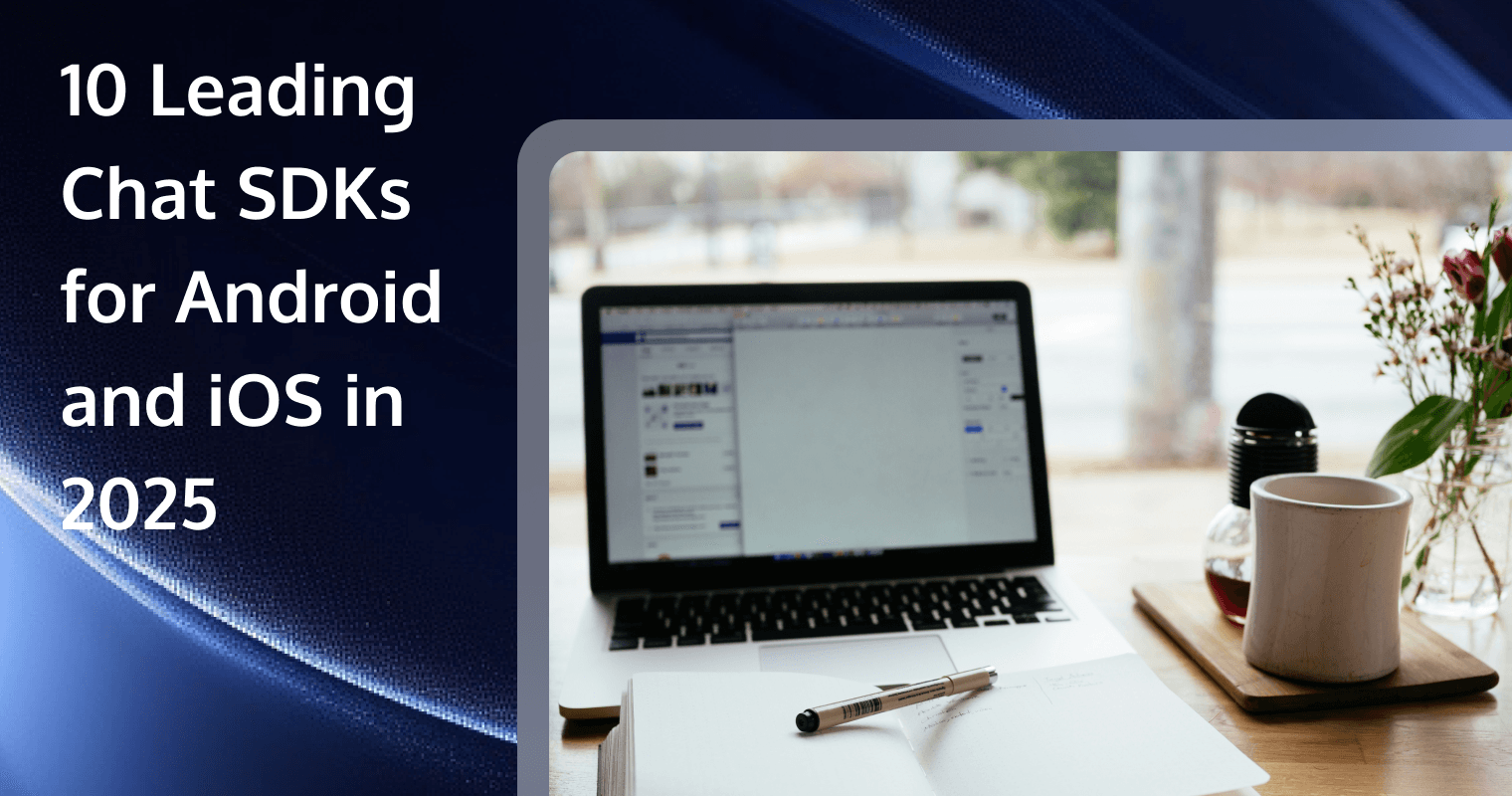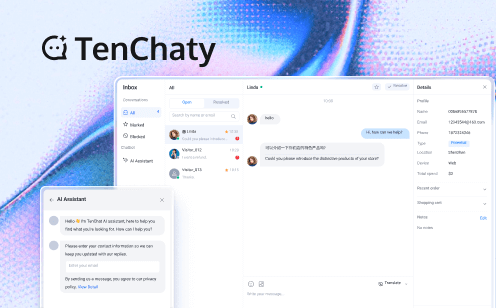 One-sentence overview
One-sentence overview
Chat SDKs enable developers to integrate real-time messaging, voice, and video capabilities into mobile apps without building complex infrastructure from scratch, addressing the growing demand for instant communication as social-networking apps account for 31% of mobile downloads in 2025.
Why developers need a chat SDK today
Building chat features natively presents significant challenges that modern SDKs solve efficiently. Developers face months of backend development, complex real-time infrastructure setup, and ongoing maintenance costs when building from scratch. Chat SDKs offer integration times as fast as 20 minutes, dramatically reducing time-to-market.
Cross-platform support for Android, iOS, and web eliminates the need for separate implementations, while built-in security features like end-to-end encryption ensure compliance without additional development. Modern SDKs also include AI-powered assistance and omnichannel capabilities, providing enterprise-grade features through simple API calls.
Evaluation Criteria
Selecting the right chat SDK requires evaluating multiple technical and business factors that impact long-term success. Cross-platform compatibility ensures your investment works across Kotlin, Swift, Flutter, and React Native, reducing development overhead.
Feature breadth determines functionality scope, including text messaging, media sharing, push notifications, presence indicators, and voice/video calling. Security capabilities like end-to-end encryption and HIPAA compliance are essential for regulated industries like telemedicine.
Scalability through multi-tenant architecture and global CDN coverage ensures performance as your user base grows. Integration speed measured by documented setup times and sample UI kits affects development velocity.
Pricing transparency from free tiers to enterprise pricing ranges impacts budget planning, while developer experience through quality documentation, sample code, and community support determines implementation success.
The Top 10 Chat SDKs for Android and iOS in 2025
1. Tencent RTC (TRTC) Chat SDK
Core offering: Comprehensive real-time communication platform combining ultra-low latency messaging, AI-powered audio/video, and conversational AI in one integrated suite, delivering enterprise-grade infrastructure with developer-friendly implementation.
Key features: End-to-end encryption with HIPAA compliance, AI-powered noise suppression and echo cancellation, customizable UI kits for Kotlin, Swift, and Flutter, global network spanning 200+ regions, and seamless integration with conversational AI capabilities including ASR, TTS, and LLM orchestration.
Pricing hint: Flexible enterprise pricing with comprehensive free developer sandbox supporting full feature testing and rapid prototyping.
Typical use case: Telemedicine platforms requiring HIPAA-grade security and integrated video calling, education applications with AI-driven tutoring, and enterprise collaboration tools benefit from TRTC's reliability, security focus, and multimodal interaction capabilities.
2. MirrorFly
Core offering: Self-hosted and cloud deployment options with 100% white-label customization, giving developers complete brand control over chat interfaces.
Key features: Real-time text messaging, media sharing, group chat, AI-driven bots, and integrated video calling provide comprehensive communication tools.
Pricing hint: Tiered pricing starting at $19 per agent per month makes it accessible for growing businesses.
Typical use case: Social and dating applications requiring full brand control benefit from MirrorFly's white-label approach and customization flexibility.
3. Sendbird
Core offering: Enterprise-grade SDK with robust content moderation tools designed for high-volume applications requiring automated oversight.
Key features: Threaded conversations, intelligent push notifications, and comprehensive analytics dashboard enable sophisticated chat experiences.
Pricing hint: Custom enterprise quotes with free tier supporting up to 1,000 MAU accommodates both startups and enterprises.
Typical use case: Customer-support chat embedded in e-commerce applications leverages Sendbird's moderation and analytics capabilities.
4. Twilio Programmable Chat
Core offering: Cloud-first API with extensive global infrastructure ensuring reliable message delivery worldwide.
Key features: SMS fallback capabilities, voice/video integration via Twilio Voice, and serverless functions create omnichannel experiences.
Pricing hint: Pay-as-you-go model at $0.01 per active user per month provides predictable scaling costs.
Typical use case: Ride-sharing applications requiring reliable driver-passenger messaging benefit from Twilio's infrastructure reliability.
5. PubNub
Core offering: Real-time data streaming platform with chat functionality optimized for low-latency applications.
Key features: Presence detection, message history, and sub-second message routing enable real-time user experiences.
Pricing hint: Free tier supporting up to 1 million messages monthly, with paid plans starting at $49 per month offers generous free usage.
Typical use case: Gaming platforms requiring in-game chat with sub-second latency leverage PubNub's real-time optimization.
6. CometChat
Core offering: Ready-made UI kits for Android, iOS, and web platforms accelerating development with pre-built components.
Key features: Group video calling, file sharing, real-time translation, and automated moderation bots provide comprehensive communication tools.
Pricing hint: Plans starting at $99 per month for 5,000 MAU targets mid-market applications.
Typical use case: Education applications requiring breakout rooms and screen sharing benefit from CometChat's collaboration features.
7. Stream (GetStream)
Core offering: Developer-friendly APIs with native React Native and Swift SDKs emphasizing ease of integration.
Key features: Activity feeds, reaction systems, and offline synchronization create engaging social experiences.
Pricing hint: Free tier supporting up to 5,000 MAU, with paid plans from $399 per month targets established applications.
Typical use case: Social networks blending chat with activity streams leverage Stream's social-focused features.
8. QuickBlox
Core offering: Full-stack communication suite including video calling and push notifications in a single platform.
Key features: Real-time chat, WebRTC integration, and built-in analytics provide comprehensive communication tools.
Pricing hint: Free tier supporting up to 1,000 MAU, with paid plans starting at $199 per month targets growing businesses.
Typical use case: Small-to-medium businesses adding chat to SaaS products benefit from QuickBlox's all-in-one approach.
9. Layer (now part of Voximplant)
Core offering: Scalable chat API with serverless function integration for custom business logic implementation.
Key features: Rich media messaging, read receipts, and typing indicators provide standard chat functionality.
Pricing hint: Usage-based pricing at $0.005 per message offers predictable per-interaction costs.
Typical use case: Financial services requiring encrypted transaction-related messaging benefit from Layer's security focus.
10. Pusher Chatkit (legacy, still used in legacy apps)
Core offering: Simple RESTful chat API with WebSocket fallback for straightforward implementation.
Key features: User presence, read status indicators, and rapid onboarding enable basic chat functionality.
Pricing hint: Free tier supporting 200,000 messages monthly, with paid plans from $49 per month accommodates small applications.
Typical use case: Startup prototypes requiring rapid MVP delivery benefit from Pusher's simplicity.
Comparison Table
| SDK | Cross-platform Support | Core Features | Security | Free Tier | Starting Price | Typical Use Cases |
|---|---|---|---|---|---|---|
| Tencent RTC | iOS, Android, Web, Flutter | AI features, video, conversational AI | HIPAA compliance, E2E encryption | Yes (sandbox) | Custom quote | Telemedicine, education, enterprise |
| MirrorFly | iOS, Android, Web | Text, media, video, AI bots | E2E encryption | No | $19/month | Social, dating apps |
| Sendbird | iOS, Android, Web | Threading, analytics, moderation | E2E encryption | Yes (1K MAU) | Custom quote | E-commerce support |
| Twilio | iOS, Android, Web | SMS fallback, voice/video | Enterprise security | No | $0.01/user/month | Ride-sharing |
| PubNub | iOS, Android, Web | Presence, low-latency | Standard encryption | Yes (1M msgs) | $49/month | Gaming platforms |
| CometChat | iOS, Android, Web | Group video, translation | E2E encryption | No | $99/month | Education apps |
| Stream | iOS, Android, Web | Activity feeds, reactions | Standard security | Yes (5K MAU) | $399/month | Social networks |
| QuickBlox | iOS, Android, Web | WebRTC, analytics | Standard security | Yes (1K MAU) | $199/month | SaaS products |
| Layer | iOS, Android, Web | Rich media, receipts | E2E encryption | No | $0.005/message | Financial services |
| Pusher | iOS, Android, Web | Presence, read status | Basic security | Yes (200K msgs) | $49/month | MVP prototypes |
Why Tencent RTC Stands Out
• Global network coverage spanning 200+ regions with guaranteed sub-300ms latency for optimal user experience worldwide • AI-driven noise suppression and echo cancellation delivering crystal-clear audio quality in any environment, surpassing industry standards • Fully customizable UI kits for Android, iOS, and Flutter enabling rapid deployment in 2-3 days with complete brand consistency • End-to-end encryption and compliance with HIPAA, GDPR, and ISO 27001 standards for regulated industries, ensuring enterprise-grade security • Conversational AI integration with customizable ASR, TTS, and LLM capabilities enabling human-like interactions at scale • Code-free Playground environment allowing developers to test and configure features without writing code, accelerating proof-of-concept development • Enterprise trust with 5,000+ global brands relying on the platform for mission-critical communications across education, healthcare, gaming, and customer service • Multimodal support combining text, voice, video, and AI in one cohesive suite, eliminating the need for multiple vendor integrations
Integration Tips for Developers
Create a TRTC account and generate API keys from the developer console, ensuring secure credential management from project inception.
Add the SDK via Gradle for Android or CocoaPods for iOS, referencing the official documentation for current version numbers and dependency requirements.
Initialize the SDK with your App ID and User Token, implementing proper token renewal using server-side webhooks to maintain session continuity.
Choose a UI kit from available options (Kotlin, Swift, Flutter) and integrate the pre-built chat view into your application layout for rapid deployment.
Enable AI moderation by configuring the enableAI flag and setting up custom profanity filters to maintain appropriate content standards.
Test across network conditions using the built-in network emulation tool to verify performance under various connectivity scenarios before production deployment. Selecting the right chat SDK in 2025 requires balancing technical capabilities, integration speed, and long-term scalability needs. While each platform offers unique strengths, developers should prioritize cross-platform compatibility, security features, and pricing transparency when making decisions.
Tencent RTC leads the market with its comprehensive AI-powered features, ultra-low latency global infrastructure, and enterprise-grade security, making it the optimal choice for applications requiring reliable, high-quality communication. Whether building a social app, telemedicine platform, or e-commerce solution, Tencent RTC's integrated approach to real-time communication and conversational AI accelerates development while ensuring scalable, secure user experiences that exceed industry standards.
Start with Tencent RTC's free developer sandbox or explore other platforms' free tiers to test integration complexity and feature alignment before committing to production deployments.
Frequently Asked Questions
What is a chat SDK?
A chat SDK is a collection of pre-built libraries that enables developers to add real-time messaging, voice and video features to mobile apps without building backend infrastructure from scratch. It provides APIs, UI components and server infrastructure to handle message routing, user management and real-time synchronization across devices, reducing development time from months to days.
Can I use a chat SDK for both Android and iOS?
Yes, modern chat SDKs provide native libraries for both platforms with cross-platform compatibility. Tencent RTC offers native SDKs for Kotlin/Java on Android and Swift/Objective-C on iOS, plus Flutter and React Native support for shared code reuse. This approach maintains native performance while reducing development overhead.
How does end-to-end encryption work in a chat SDK?
End-to-end encryption encrypts messages on the sender's device using cryptographic keys and decrypts them only on the recipient's device. No intermediate servers can read the message content since encryption keys are managed locally on user devices. Tencent RTC implements industry-standard encryption with HIPAA, GDPR and ISO 27001 compliance for enterprise-grade security.
Is there a free tier for testing a chat SDK?
Most chat SDK providers offer free developer tiers for prototyping and testing. Tencent RTC provides a free developer sandbox that includes core messaging, voice and video features with usage limits suitable for development and small-scale testing. Free tiers typically support limited monthly active users but include essential functionality.
What pricing models are common for chat SDKs?
Chat SDK providers typically use three pricing models: usage-based pricing per message or active user, tiered monthly subscriptions based on feature access and user limits, or custom enterprise contracts. Pricing ranges from $19 to $749 per month depending on scale and features. Tencent RTC offers custom enterprise pricing with transparent cost structures for different usage tiers.

